The Valley of Decision (1945)
By Toronto Film Society on April 7, 2020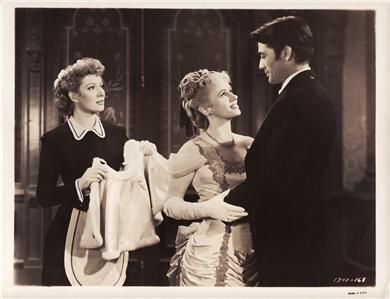
Toronto Film Society presented The Valley of Decision (1945) on Monday, February 21, 1983 in a double bill with The Man Who Shot Liberty Valance as part of the Season 35 Monday Evening Film Buffs Series “B”, Programme 7.
Production Company: Metro-Goldwyn-Mayer. Producer: Edwin H. Knopf. Director: Tay Garnett. Screenplay: John Meehan and Sonya Levien, from the novel by Marcia Davenport. Music: Herbert Stothart. Art Direction: Cedric Gibbons, Paul Groesse. Cinematographer: Joseph Ruttenberg. Special Effects: A. Arnold Gillespie. Editor: Blanche Sewell.
Cast: Greer Garson (Mary Rafferty), Gregory Peck (Paul Scott), Donald Crisp (William Scott), Lionel Barrymore (Pat Rafferty), Preston Foster (Jim Brennan), Gladys Cooper (Clarissa Scott), Marsha Hunt (Constance Scott), Reginald Owen (McCready), Dan Duryea (William Scott, Jr.), Jessica Tandy (Louise Kane), Barbara Everest (Delia), Marshall Thompson (Ted Scott), Mary Lord (Julia Gaylord), John Warburton (Earl of Moulton), Mary Currier (Mrs. Gaylord), Arthur Shields (Callahan), Russell Hicks (Mr. Gaylord), Dean Stockwell (Paulie), Lumsden Hare (Dr. McClintock), Anna Q. Nillson (Nurse).
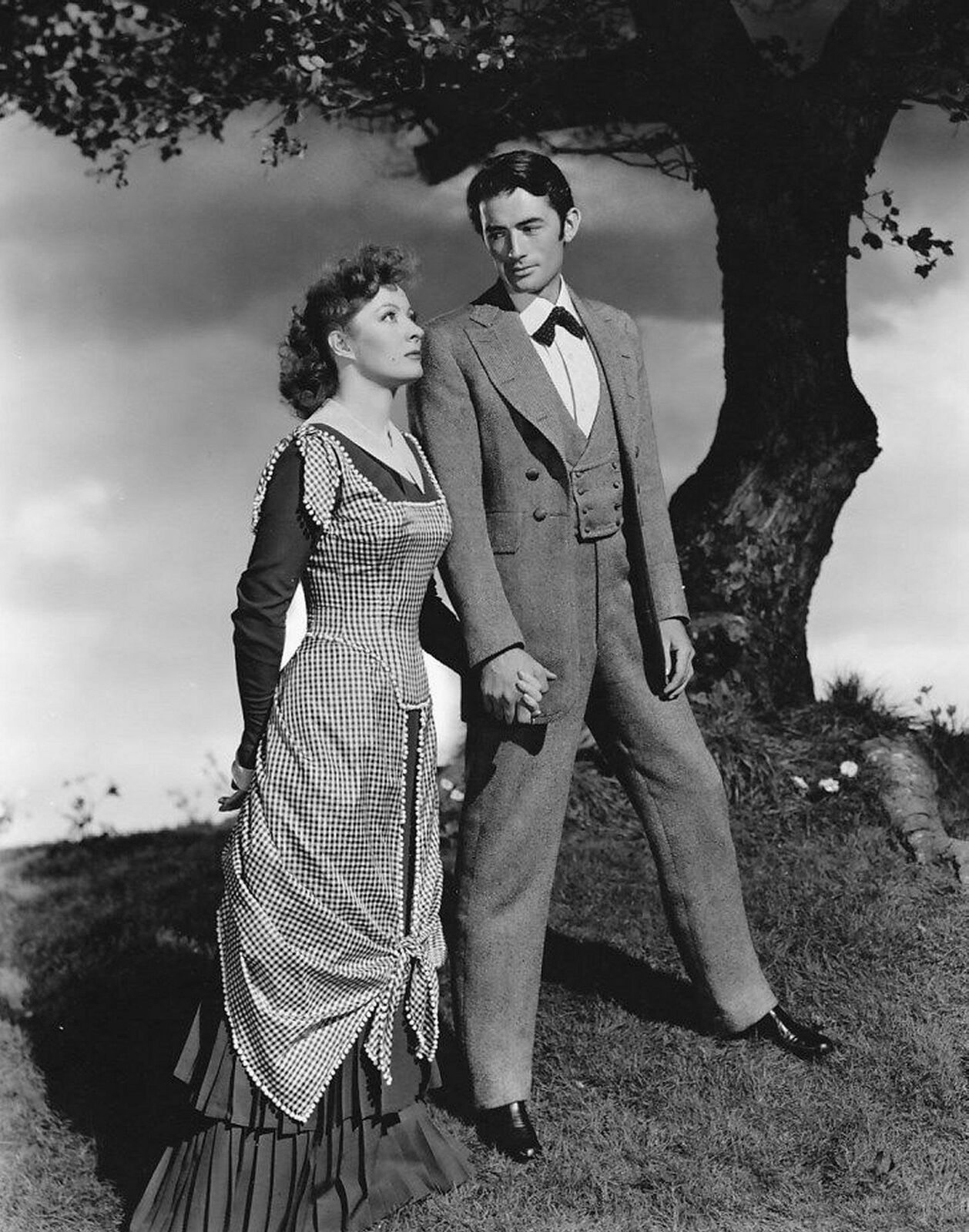
Family histories extending over several generations have been of especial appeal to a deracinated twentieth century. When the family consists of 2.2 people, spread from one end of the country to the other, then families of ten with roots firmly planted in the same place for a hundred years have a strong attraction. Galsworthy’s Forsyte Saga reached the peak of its popularity in the rootless twenties (about the same time as Marie Stopes), and a second peak as a television serial fifty years later (in the age of zero population growth). Then there were Hugh Walpole’s Herries Chronicle, and Mazo de la Roche’s Jalna series. And Roots, even as The Winds of War die down, remains the most popular programme ever shown on television. Marcia Davenport’s best-selling novel of 1943 (a year of separation of families), The Valley of Decision, belongs to the same genre. It begins as the fifteen-year old Mary Rafferty, from the Irish tenements of Pittsburgh, begins as a maid in the big house of the Scotts, steel magnates. The year is 1873, and the novel continues until 1941, with Mary now the still unmarried housekeeper. In youth, she has had the opportunity of marrying the second son of the family, Paul Scott, but has renounced him out of a sense of duty, staying on long after his death to become the matriarch and mother confessor to the second and third generations.
For the film, MGM unveiled its full galaxy of stars and supporting players. Greer Garson, though it may be difficult to remember now, was at the height of her popularity in 1945. Playing Mary Rafferty, she was genuinely Irish herself (at least from the separated counties). She had made her debut in Goodbye Mr. Chips (1939), following quickly with the role of Elizabeth Bennet in Pride and Prejudice, and would over the next five years be nominated for the Best Actress Oscar no fewer than five times–for Blossoms in the Dust, Mrs. Miniver (the only time she won), Madame Curie, Mrs. Parkington (another family saga), and The Valley of Decision (Joan Crawford won it that year for Mildred Pierce). She received a sixth nomination in 1960 for Sunrise at Campobello, in which she played a toothy if not toothsome Eleanor Roosevelt. But in 1945 her moment was already passing. Her next film would be Adventure, the publicity line for which–“Gable’s back and Garson’s got him”–suggests her equal status with the King, but the headline of a review of The Forsyte Saga (1949) pretty much writes the epitaph to her brief but spectacular career–“Goodnight, Irene!”
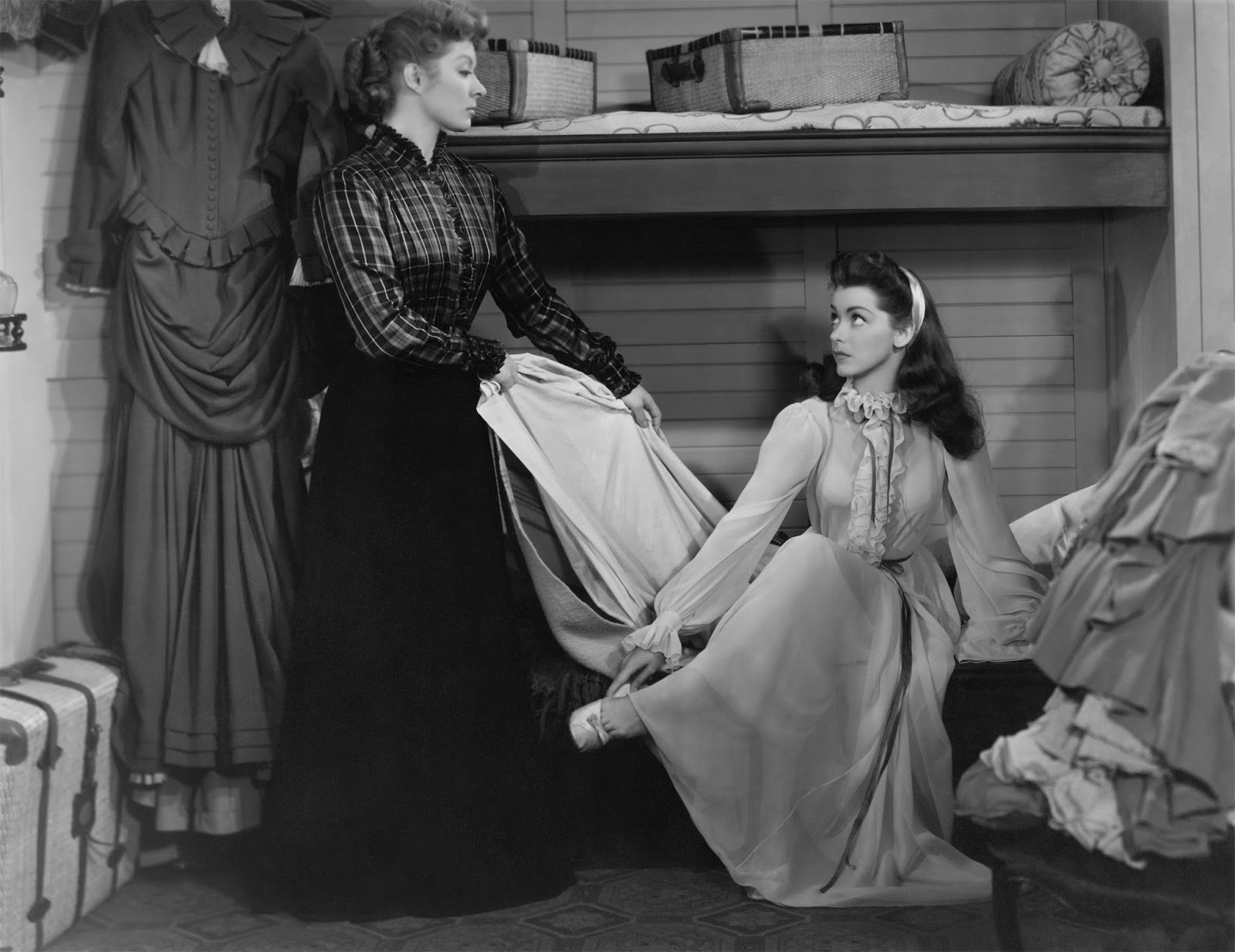
Playing opposite Garson was not her historic co-star Walter Pidgeon, but a young actor already arrived at stardom after only two pictures, and an Oscar nomination for the second, The Keys of the Kingdom. Though Garson was nearly ten years older than Peck, they make a credible team here.
Supporting the two stars are a group of distinguished character actors such as only MGM could muster. The innumerable roles played since Griffith’s days at Biograph by Donald Crisp and Lionel Barrymore need no citation here, except to say that, as antagonists in this film, their well-established screen images represent intractable rectitude (How Green Was My Valley, Lassie Come Home) against intractable crankiness (You Can’t Take It With You, the Doctor Kildare series.) A handful of other players should be singled out: Marsha Hunt played ingenue roles through the forties, perhaps most notably in two other Garson pictures, as the studious Mary Bennet in Pride and Prejudice, and in Blossoms in the Dust; Dan Duryea had been playing weak sons or villains since The Little Foxes (1941), though his best and most self-defining role, in Fritz Lang’s Scarlet Street, was still before him; Jessica Tandy, in this her fourth (second American) film, played the kind of sexually repressed spinster whose repression occasionally went over into monstrosity, as in A Woman’s Vengeance, and–according to one reading–Hitchcock’s The Birds; and Dean Stockwell, in his very first role, was starting a career which probably peaked three years later with The Boy With Green Hair, but which later developed along original or difficult-adolescent lines in such films as Compulsion.
The Valley of Decision is an actor’s film, and actors sell only tickets; auteurs sell critics. It was ignored or deplored by the National Board of Review, and Bosley Crowther. Only the trade journals and the public liked it.
Notes by Barrie Hayne
You may also like...
-
News

Frances Blau
Toronto Film Society | February 27, 2024On Monday, February 26th, 2024, Toronto Film Society lost longtime friend, supporter, and board member Frances Blau. Known for her sense of humour, her love of film, her generosity,...
-
Special Events

Arsenic and Old Lace (1944) at the Paradise Theatre
Toronto Film Society | April 21, 2024Toronto Film Society presents Arsenic and Old Lace (1944) at the Paradise Theatre on Sunday, May 5, 2024 at 2:30 p.m. Screwball comedy meets the macabre in one of...
Programming

Virtual Saturday Night at the Movies
Toronto Film Society | April 11, 2024Toronto Film Society is back in the theatre! However, we’re still pleased to continue to bring you films straight to your home! Beginning Season 73 until now we have...
4-
 Toronto Film Society | April 21, 2024
Toronto Film Society | April 21, 2024
-
 Toronto Film Society | November 6, 2022
Toronto Film Society | November 6, 2022
-
 Toronto Film Society | August 1, 2023
Toronto Film Society | August 1, 2023
Donate to Toronto Film Society – We’re now a Registered Charity!
-
Copyright © 2017 Toronto Film Society.

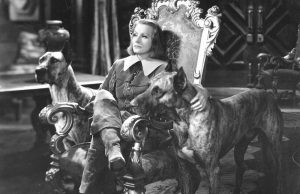
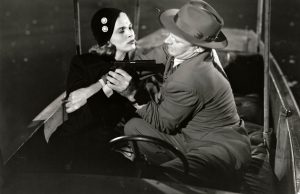
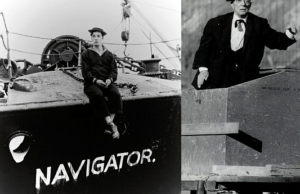
Leave a Reply